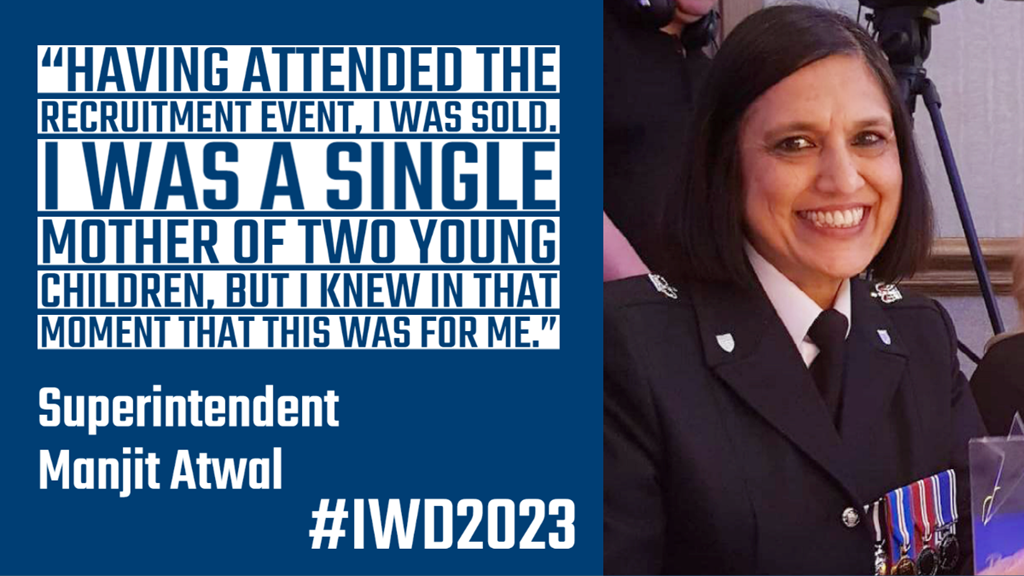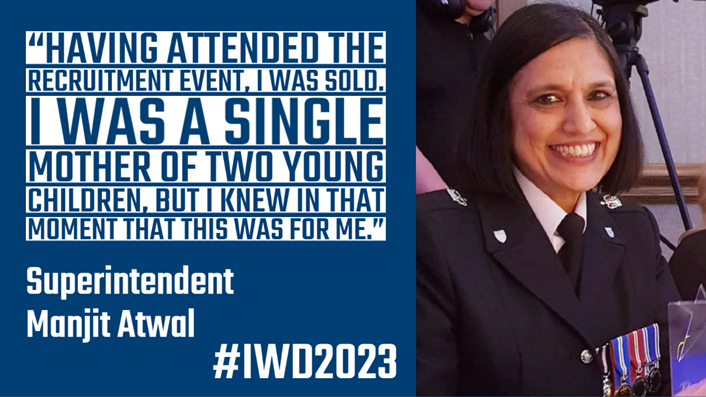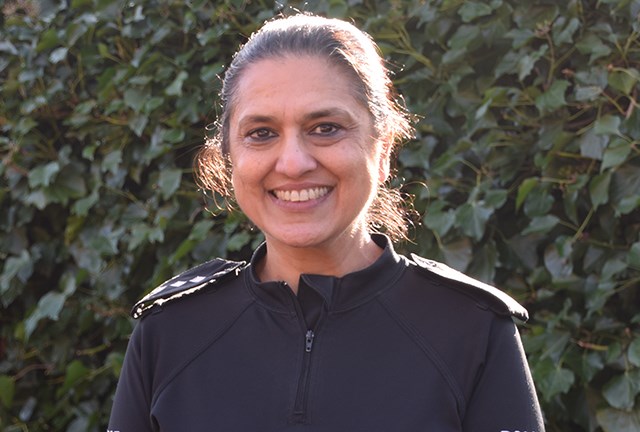
08 Mar 2023
International Women's Day: why I became a police officer
Growing up, I do not remember ever seeing a police officer that looked like me.
My family originate from the Punjab in India; my dad came over in 1958, followed by my mother in 1962. I was born in Derbyshire and raised with an understanding of my Sikh culture and family values, and these two things are a vital part of who I am. Sikhs believe in the oneness of all beings and the equality of everyone, truthful living and service to humanity. These principles align with so much within policing, like the Peelian Principles and the Professional Standards of Policing.
I have to confess, policing was not my first choice: I wanted to be a nurse. However, my motivations were the same. I wanted to help people, to nurture other women, and bring those from my community along with me. I married at 18 and my career aspirations for nursing conflicted with the family I had married into.
After a divorce a few years later, I saw a police recruitment campaign in Leicestershire, and importantly, the emphasis was on recruiting from the diverse community of Leicestershire. I decided to go along to an open day.
I will admit that up until that moment in my life, my personal experience of policing had not been good. I had found the same when speaking to others within my community. This is due to only ever dealing with police during incidents of hate crime, domestic abuse or forced marriages. When you don’t see yourself reflected in the police, that makes it harder to take the leap to apply, to be the first, the standout, the only one.
Having attended the recruitment event, I was sold. I was a single mother of two young children, but I knew in that moment that this was for me. This is not to say I haven’t faced challenges along the way; in the first few weeks of training I faced accusations that I had only been hired to fill a quota. I can say it now, 28 years in, but I showed them all why I had really been hired. I attested at the top of my intake and that put an end to their comments!
Women do not tend to shout about their success, and I have never been someone to highlight my wins, but I have a very clear goal: to celebrate and help other women who may not have considered policing as a career to apply.
Whatever that barrier may be, I want to try and break it down. Sharing and talking about our experiences as women from different backgrounds is a start, so here are a few of my proudest moments, which I share in the hope that someone will read this and think this could be for them too:
- In 2021 I received a Queens Police Medal (QPM). For me this medal is a physical recognition of how important it is for police to engage in communities, listen to their voices and hear their feedback. As a Neighbourhood Inspector, I brought my values to the job. Working hard and building relationships is fundamentally what led to my QPM. The different people I met along the way, and being there for them in their hour of need, is exactly why I joined.
- I have been a hostage negotiator for 12 years. This is one of the most challenging things I have taken on, but also the most rewarding when helping to bring something to a successful end. One night, I was woken up and called to an individual in crisis. Knowing that I had the skills and ability to help allowed me to stay calm while I negotiated with them. I am proud to say that the result was the individual received the support they needed.
- I have spent the last 10 years of my service supporting recruitment retention and progression of those from Black and Minority communities. It is so important people look at the officers in their community and think they are represented. I don’t just want people to join: I want them to stay, to develop, get promoted and do incredible things. I see potential everywhere in my community, we just need to help people realise it. I am proud I have been able to make an impact here, but this must continue.
I am currently on secondment to the violence against women and girls taskforce, heading up the response from the College of Policing. This work is so important to improve trust and confidence in policing. Getting to work with brilliant men and women from all areas of policing, who all feel so strongly about improving the policing response, has been such a privilege. We have a long way to go but prioritising the safety of other women will always be important to me and the rest of the team. When women speak up for other women, it really can lead to the positive change we want to see.
I would love to see a woman of colour become a Chief Constable, which is something that hasn’t been achieved to date. Development and progression must continue for women, but especially women of colour. If I can help and leave a legacy of inclusivity and support then when retirement comes around, I know I will be logging off with my head held high.
Superintendent Manjit Atwal, Leicestershire Police and College of Policing.
Contact information
Communications office
By phone: 0800 538 5058
By email: press.office@npcc.police.uk



